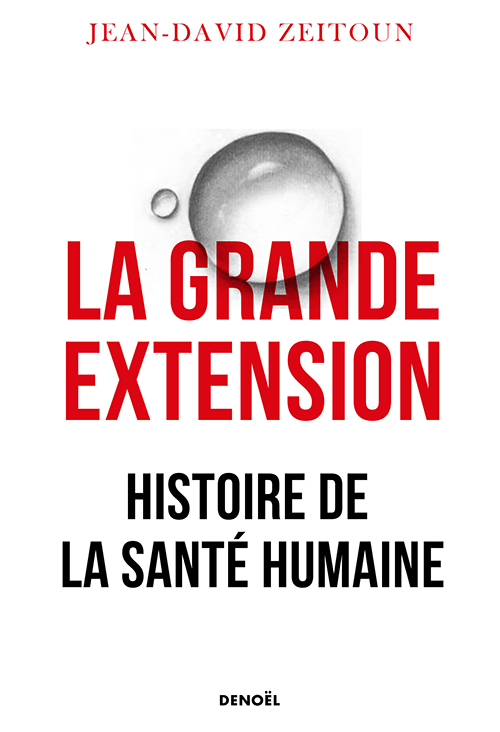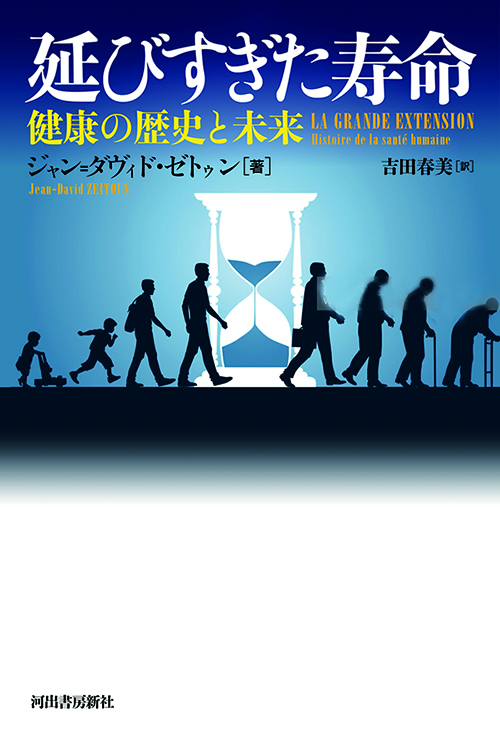HEADLINER

Humanities and Non-Fiction
THE GREAT EXTENSION, A HISTORY OF HUMAN HEALTH
In La Grande Extension, medical doctor and epidemiologist Jean-David Zeitoun traces the history of human health through natural sciences, human sciences, urban planning and psychology. Taking into account the global post-Covid challenges and impacts of climate change, he explains the current health risks and proposes solutions.
While there are many books on the history of medicine, there are very few on the history of health that talks of people and their living conditions. As Jean-David Zeitoun points out in his introduction: "Medicine is only 10-20% of health. The other three aspects of health are behavior, environment and biology, i.e. age, gender and our genetic make-up."
For a long time, the history of health in Europe was that of the "great extension": advances in public health - sanitation, access to drinking water, nutrition - and the progress of medicine, all leading to increasing life expectancy over the past 250 years – that is, tripling of longevity from that of 1750.
But the curve could reverse due to environmental factors - pollution and climate change - and behavioral ones - tobacco, alcohol and poor eating habits. "In the United States, longevity has been decreasing since 2010, with a peak in 2014 due to overdoses. Covid reduced life expectancy by eighteen months there, whereas only by six months in France," explains the author in an interview, while pointing out that the pandemic is only one example of the new health risks people are facing.
"During the pandemic, we saw a lot of quickly written books on health being published. La Grande Extension is different, it is a 'big idea book', one which is destined to become evergreen and a reference work," says Margherita Giubelli-Bortolami, Head of Rights at Denoël, who has already sold the rights to the book in five countries.
"The multidisciplinary nature of the text has really seduced foreign publishers. The author combines natural sciences with human and social sciences in a very fluid and organic way bringing together biology, medicine, history, economics, political science, urban planning, psychology, sociology and many other fields of knowledge. The book is also enhanced by examples and reflections based on international thought," she adds.
Jean-David Zeitoun goes beyond simple observations of current health problems, he considers avenues to mitigate them. From public health technologies which influence behavior to new clinical technologies based on artificial intelligence capable of improving the identification and prediction of diseases.
"This book does not claim to be a description of what humans should do (...) [But, if they] want to continue to make health a priority, it will be helpful for them to understand what has worked and what has failed. Sufficient information on health’s historical determinants could be a critical determinant of public action," says Zeitoun in his preface.
Katja Petrovic
September 2022
In La Grande Extension, medical doctor and epidemiologist Jean-David Zeitoun traces the history of human health through natural sciences, human sciences, urban planning and psychology. Taking into account the global post-Covid challenges and impacts of climate change, he explains the current health risks and proposes solutions.
While there are many books on the history of medicine, there are very few on the history of health that talks of people and their living conditions. As Jean-David Zeitoun points out in his introduction: "Medicine is only 10-20% of health. The other three aspects of health are behavior, environment and biology, i.e. age, gender and our genetic make-up."
For a long time, the history of health in Europe was that of the "great extension": advances in public health - sanitation, access to drinking water, nutrition - and the progress of medicine, all leading to increasing life expectancy over the past 250 years – that is, tripling of longevity from that of 1750.
But the curve could reverse due to environmental factors - pollution and climate change - and behavioral ones - tobacco, alcohol and poor eating habits. "In the United States, longevity has been decreasing since 2010, with a peak in 2014 due to overdoses. Covid reduced life expectancy by eighteen months there, whereas only by six months in France," explains the author in an interview, while pointing out that the pandemic is only one example of the new health risks people are facing.
"During the pandemic, we saw a lot of quickly written books on health being published. La Grande Extension is different, it is a 'big idea book', one which is destined to become evergreen and a reference work," says Margherita Giubelli-Bortolami, Head of Rights at Denoël, who has already sold the rights to the book in five countries.
"The multidisciplinary nature of the text has really seduced foreign publishers. The author combines natural sciences with human and social sciences in a very fluid and organic way bringing together biology, medicine, history, economics, political science, urban planning, psychology, sociology and many other fields of knowledge. The book is also enhanced by examples and reflections based on international thought," she adds.
Jean-David Zeitoun goes beyond simple observations of current health problems, he considers avenues to mitigate them. From public health technologies which influence behavior to new clinical technologies based on artificial intelligence capable of improving the identification and prediction of diseases.
"This book does not claim to be a description of what humans should do (...) [But, if they] want to continue to make health a priority, it will be helpful for them to understand what has worked and what has failed. Sufficient information on health’s historical determinants could be a critical determinant of public action," says Zeitoun in his preface.
Jean-David Zeitoun goes beyond simple observations of current health problems, he considers avenues to mitigate them. From public health technologies which influence behavior to new clinical technologies based on artificial intelligence capable of improving the identification and prediction of diseases.
"This book does not claim to be a description of what humans should do (...) [But, if they] want to continue to make health a priority, it will be helpful for them to understand what has worked and what has failed. Sufficient information on health’s historical determinants could be a critical determinant of public action," says Zeitoun in his preface.
Katja Petrovic
September 2022
September 2022
